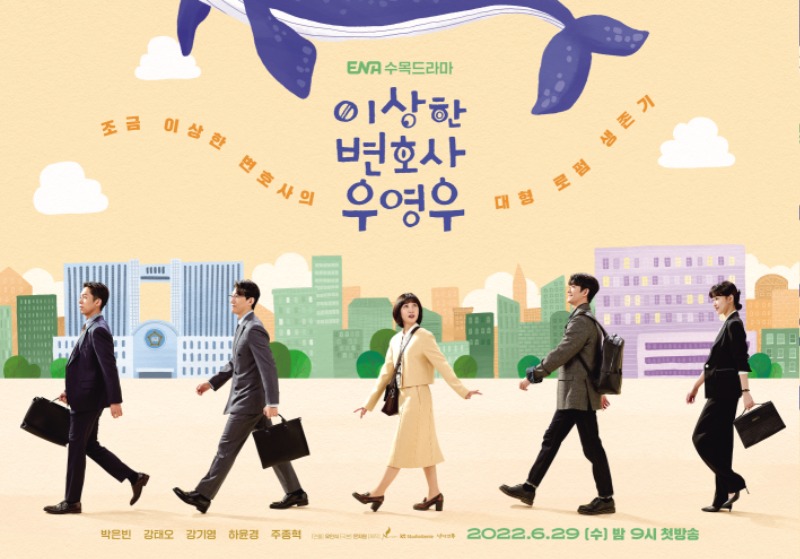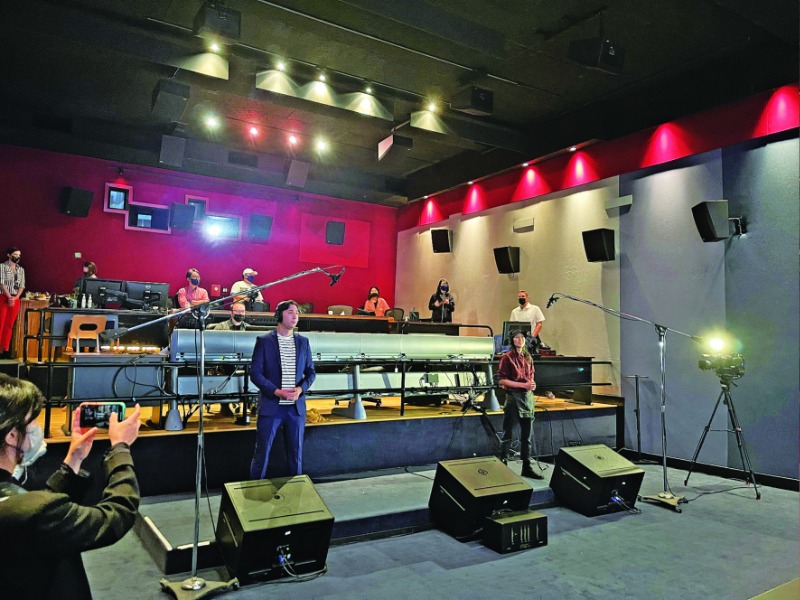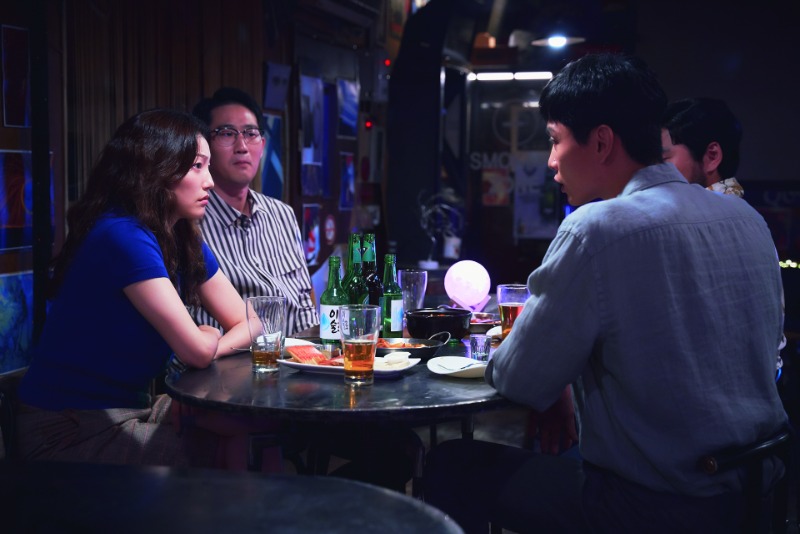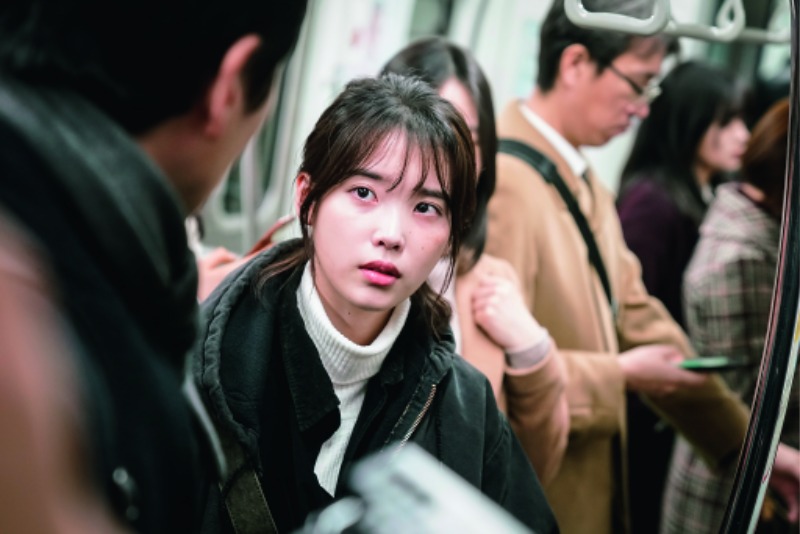The narrative of a TV series is essentially the story of people’s lives, or, indeed, a portrait of everyday life. Within this portrait, some narrative contexts are difficult to accurately convey through translation. Global fans of K-dramas inevitably express curiosity about the lifestyle of Koreans depicted in such contexts, which raises the issue of meticulous cultural translation

Poster for “Extraordinary Attorney Woo” featuring the main characters. This could be the most successful K-drama of 2022 in terms of ratings and social buzz.
© ASTORY
“Extraordinary Attorney Woo,” which aired on the ENA channel from June to August 2022, became a hit worldwide when it was made available on Netflix. Generally, global audiences prefer dubbing over subtitles. So, when Netflix obtained the streaming rights for the show it planned to provide both. Because of the tight time difference between the Korean broadcasting and streaming on the platform, however, the subtitles came out first, and the dubbing proceeded as soon as possible.
Translation itself is often a laborious process, but one line in this series proved particularly difficult. This was the protagonist Woo Young-woo’s signature self-introduction: “My name is Woo Young-woo, whether you read it straight or flipped. Gi-reo-gi, to-ma-to, S-wi-ss, in-do-in, byeol-ttong-byeol, Yeok-sam-yeok.” The character’s name “Woo Young Woo” is a palindrome: a word, phrase, or sentence that reads the same backward or forward. Words like “tomato” and “Swiss” are palindromes in Korean but not in English.
This self-introduction by Woo Young Woo, a genius attorney with autism, is so well-known and symbolic that extra care was taken with its translation. After much deliberation, it was rendered as “Kayak, deed, rotator, noon, racecar. Woo Young-woo and civic.” Rather than a literal word-for-word translation of the original Korean, these English palindromes were carefully selected with the cultural context in mind. Sue Ann Pien, an actor who is also on the autism spectrum, was cast as the voice actor for the lead character.
If Yeoksam Station (Yeok-sam-yeok) had not been the location of Woo’s law firm, she likely would not have included it in her self-introduction. But the protagonist has a relatively narrow range of social connections, so the area is not simply the location of her office, but a very important part of her life. The station is located in Yeoksam-dong in Gangnam, a district that is home to the wealthiest demographic in Seoul as well as to a host of major global Korean corporations and large law firms. Woo’s fictional law firm, Hanbada, is one of the top law firms in Korea, and hence its Yeoksam-dong location is highly credible. Such a seemingly trivial detail is actually an important element that heightens the realism of the series.
The Difference Between “Strange” and “Special”
With the surge in the worldwide popularity of K-dramas, it is increasingly important for translations to faithfully reflect the underlying nuances and everyday lives of the Koreans they depict. This has raised awareness of the importance of delivering cultural translations with a high degree of quality and accuracy. Translation involves more than simply converting words from the source to the target language. Many factors need to be taken into account, including the nuances of words, as is evident in the translation of the title “Extraordinary Attorney Woo.” A literal rendering of the Korean title would be “Strange Attorney Woo.” The word “strange,” however, meaning something unusual, odd, or suspicious, would not be a fitting deion of Woo’s character. This is a compelling reason for its rendering as “extraordinary,” which connotes something special or remarkable.

Voice actors dubbing the English for “Extraordinary Attorney Woo” at Dubbing Brothers, a studio in Burbank, California, in August 2022. To do full justice to the original , Asian actors with a better understanding of Korean culture were cast.
ⓒ Cine21
Universal but Different
Directed by Hwang Dong-hyuk, the 2021 original Netflix series “Squid Game” became a global sensation, in large part due to its portrayal of cultural distinctiveness. The plot revolves around 456 adults who, in an ironic twist, risk their lives to compete in a series of Korean children’s games in a bid to win the huge cash prize of 45.6 billion won (US$33 million). Some of the games exist in similar form in other countries, but most are distinctive to Korea. These include the dalgona (or ppopgi) challenge, where players have to carve out a shape etched into a traditional Korean sugar candy without breaking it. This game was new and unique to foreign viewers, as was the eponymous squid game.
In one particular scene, the protagonist Seong Gi-hun (played by Lee Jung-jae) buys soju (clear distilled liquor usually sold in a green bottle) and noodles at a convenience store, and then eats at a table outside. This sparked foreign viewers’ curiosity about Korean convenience stores and, indeed, that “green bottle.” Such a scene is almost a fixture of Korean dramas and movies, and international viewers saw it as a unique aspect of Korean culture, especially since some countries prohibit the sale of alcohol after certain hours or its consumption in public spaces.
“The pride of Ssangmun-dong, the genius Cho Sang-woo of SNU” is a line that is heard frequently throughout “Squid Game.” Located in Gangbuk, a district in northern Seoul, Ssangmun-dong is generally considered as a distinctly average neighborhood, especially when compared to the more affluent Gangnam. The line defines the character Cho Sang-woo: raised by a single mother who worked hard as a fishmonger to make sure she could give her son the best opportunity to succeed in life, he is a graduate of Seoul National University (SNU), the top-ranking university in Korea. It also encapsulates some complex issues gripping Korean society: the plight of traditional market vendors who are being pushed out by superstores; the common notion that going to a prestigious university guarantees upward social mobility; and the stark divide in the real estate market between Gangnam and Gangbuk. These deeper ideas hidden within the line are easily identified by the Korean audience but not necessarily conveyed fully to foreign viewers.

The JTBC series “My Liberation Notes” (2022) tells the story of people dreaming of escape from their monotonous lives. Peppered throughout are scenes where the characters drink soju with family or friends. The clear distilled liquor that usually comes in a green bottle is a common K-drama metaphor for the everyday lives of ordinary people.
ⓒ JTBC
Exposing Social Issues
Directed by Yeon Sang-ho, the Netflix-produced K-drama “Hellbound” (2021) includes a subtle cultural narrative. The protagonist Jeong Jin-soo (played by Yoo Ah-in) is the leader of a religious cult with a vast following. Despite the huge emotional and financial support he receives, Jeong lives in dilapidated, cheap dormitory-style housing called gosiwon. The scene where he walks along with the detectives and enters the gosiwon when he parts from them came as a big surprise to Korean viewers. It is inconceivable that a religious cult leader with immense wealth should live in such cheap and undesirable accommodation.
Originally a low-cost residential facility for people studying for state examinations, over time gosiwon have become the last resort for those on the economic margins. The living conditions are subpar at best: the tiny, single-unit rooms generally do not have windows and measure only around 2 pyeong, or 6.6 square meters, with multiple tenants sharing a kitchen, toilet, and bathroom. When the term “gosiwon” is translated simply as “there” in English, all shades of cultural meaning and detail are lost. Depending on the target culture, gosiwon is sometimes translated as “student dormitory,” but in reality, students have long been replaced by low-wage workers.
In “All of Us Are Dead,” a 2022 Netflix zombie series, students address their classmates as “number one” or “class president” instead of using their names, as Korean students often do in real life. Some wealthy students tauntingly call a classmate “recipient,” referring to their economically disadvantaged family being recipients of basic livelihood security. Surviving high school in Korea is as fierce and competitive as enduring a zombie attack.
The originality and power of K-dramas may stem from their courage in confronting such social issues. Laying bare the problems facing society requires expertise and experience. Translations that express such narratives with subtlety and accuracy allow international viewers to more fully experience and enjoy K-dramas.

In “My Mister” (aired on tvN in 2018), the protagonist (played by Lee Ji-eun) goes home on the subway after a hard day’s work. According to the Seoul Transportation Corporation, even before COVID-19 subway trains and stations were so frequently featured in television series that filming took place somewhere in the metro system almost every day.
Courtesy of STUDIO DRAGON
Kang Yu-jung Professor, Department of Korean-English Cultural Content, Kangnam University; Pop Culture Critic